Entrepreneurial Ventures, Small Business, and Economic Impact Report
VerifiedAdded on 2020/10/23
|16
|4637
|177
Report
AI Summary
This report provides a comprehensive analysis of entrepreneurial ventures, starting with an introduction to the concept of entrepreneurship and its importance in the business world. It delves into different types of entrepreneurial ventures, including large corporations, small corporations, social corporations, and scalable corporations, along with their respective typologies. The report further explores the similarities and differences between various entrepreneurial ventures, such as small and social enterprises, scalable start-ups, large enterprises, lifestyle ventures, and serial ventures. The second task of the report assesses the impact of small and micro businesses on the economy, particularly within the UK context, highlighting their contributions to infrastructure development, employment opportunities, and national, regional, and local economic impacts. The final task focuses on the characteristics, traits, and skills of successful entrepreneurs, examining the role of entrepreneurial personality, motivation, and mindset, and the influence of background and experience on fostering entrepreneurship. The report concludes with a summary of the key findings and a list of references.

Entrepreneurship and Small
Business Management
Business Management
Paraphrase This Document
Need a fresh take? Get an instant paraphrase of this document with our AI Paraphraser
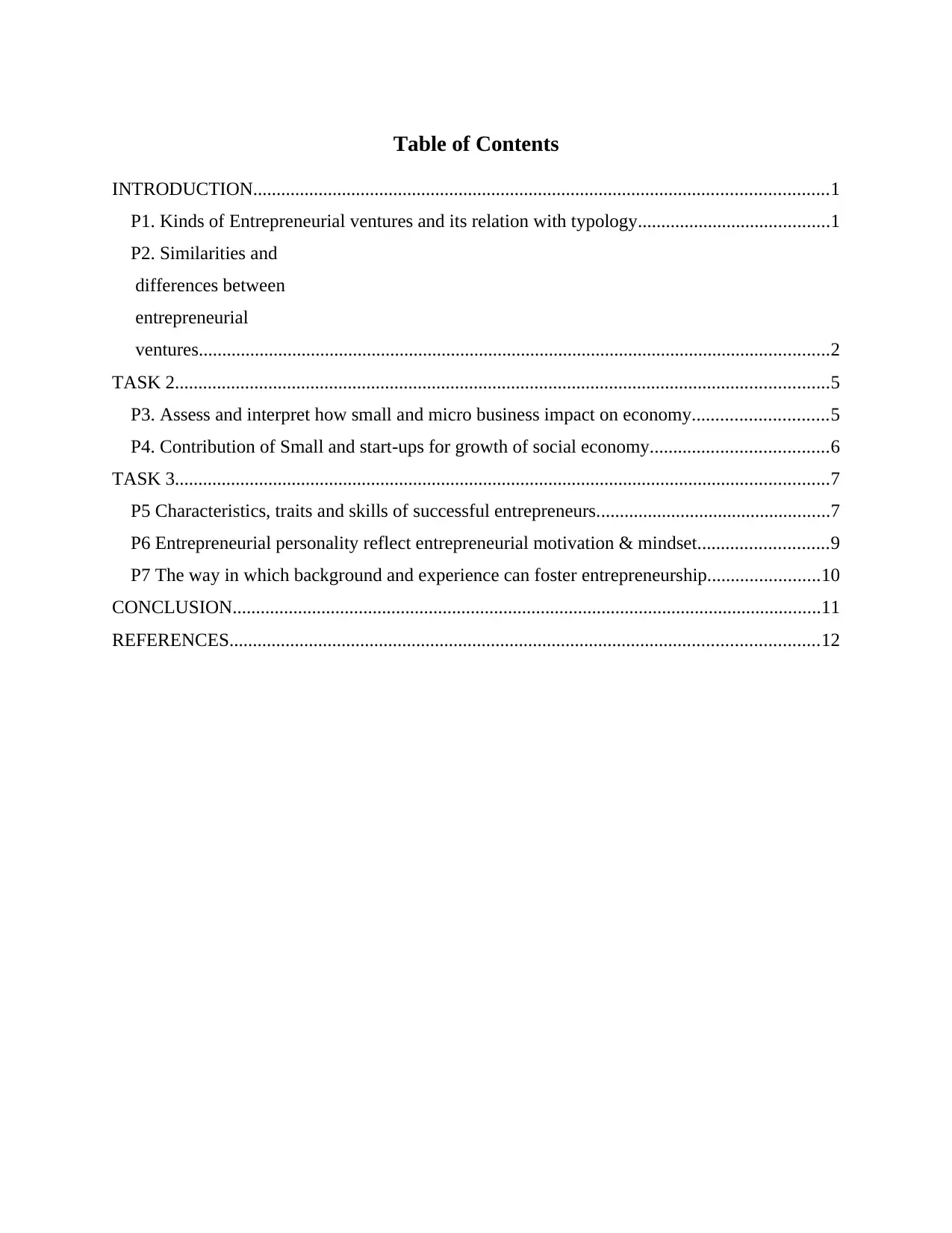
Table of Contents
INTRODUCTION...........................................................................................................................1
P1. Kinds of Entrepreneurial ventures and its relation with typology.........................................1
P2. Similarities and
differences between
entrepreneurial
ventures.......................................................................................................................................2
TASK 2............................................................................................................................................5
P3. Assess and interpret how small and micro business impact on economy.............................5
P4. Contribution of Small and start-ups for growth of social economy......................................6
TASK 3............................................................................................................................................7
P5 Characteristics, traits and skills of successful entrepreneurs..................................................7
P6 Entrepreneurial personality reflect entrepreneurial motivation & mindset............................9
P7 The way in which background and experience can foster entrepreneurship........................10
CONCLUSION..............................................................................................................................11
REFERENCES..............................................................................................................................12
INTRODUCTION...........................................................................................................................1
P1. Kinds of Entrepreneurial ventures and its relation with typology.........................................1
P2. Similarities and
differences between
entrepreneurial
ventures.......................................................................................................................................2
TASK 2............................................................................................................................................5
P3. Assess and interpret how small and micro business impact on economy.............................5
P4. Contribution of Small and start-ups for growth of social economy......................................6
TASK 3............................................................................................................................................7
P5 Characteristics, traits and skills of successful entrepreneurs..................................................7
P6 Entrepreneurial personality reflect entrepreneurial motivation & mindset............................9
P7 The way in which background and experience can foster entrepreneurship........................10
CONCLUSION..............................................................................................................................11
REFERENCES..............................................................................................................................12

⊘ This is a preview!⊘
Do you want full access?
Subscribe today to unlock all pages.

Trusted by 1+ million students worldwide
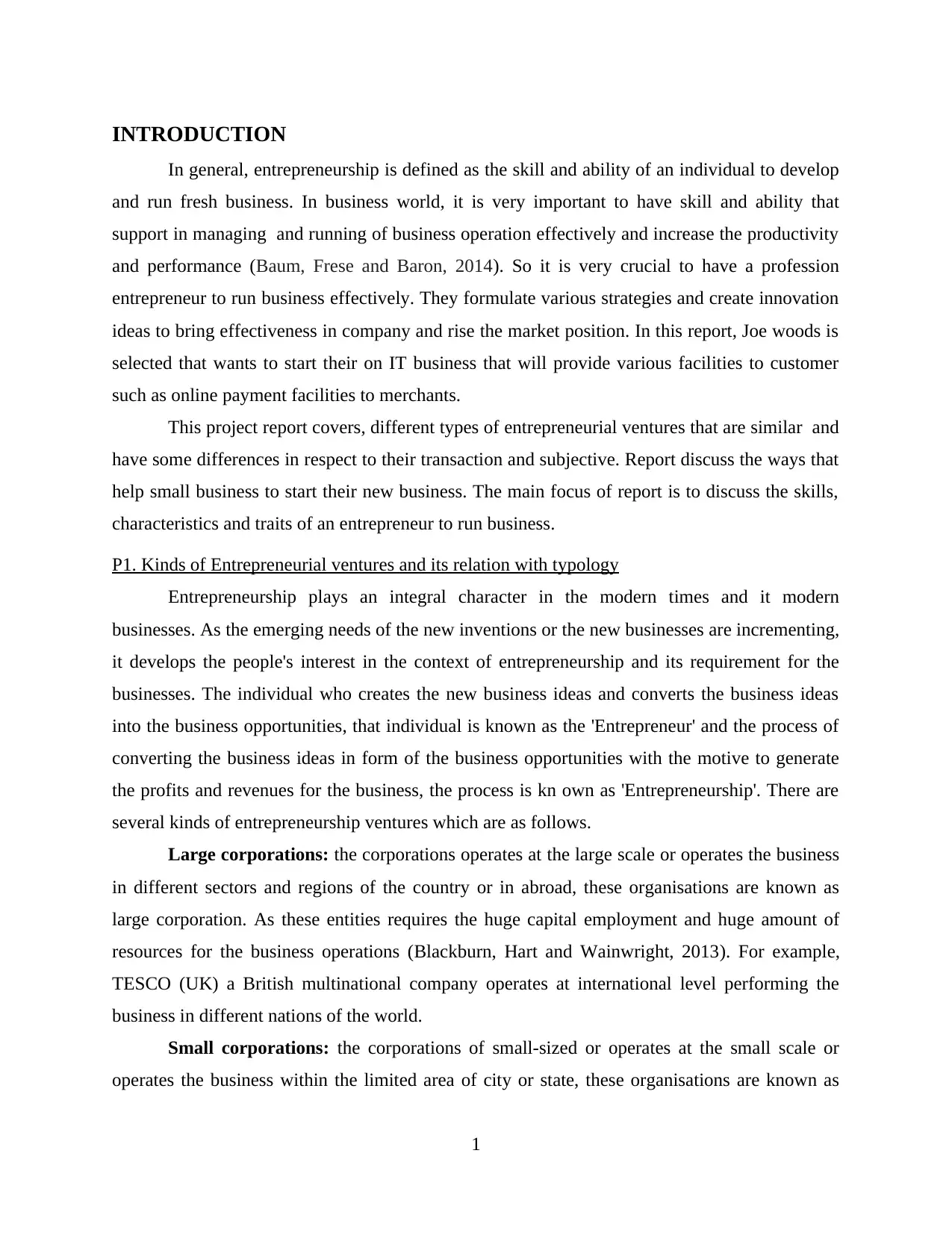
INTRODUCTION
In general, entrepreneurship is defined as the skill and ability of an individual to develop
and run fresh business. In business world, it is very important to have skill and ability that
support in managing and running of business operation effectively and increase the productivity
and performance (Baum, Frese and Baron, 2014). So it is very crucial to have a profession
entrepreneur to run business effectively. They formulate various strategies and create innovation
ideas to bring effectiveness in company and rise the market position. In this report, Joe woods is
selected that wants to start their on IT business that will provide various facilities to customer
such as online payment facilities to merchants.
This project report covers, different types of entrepreneurial ventures that are similar and
have some differences in respect to their transaction and subjective. Report discuss the ways that
help small business to start their new business. The main focus of report is to discuss the skills,
characteristics and traits of an entrepreneur to run business.
P1. Kinds of Entrepreneurial ventures and its relation with typology
Entrepreneurship plays an integral character in the modern times and it modern
businesses. As the emerging needs of the new inventions or the new businesses are incrementing,
it develops the people's interest in the context of entrepreneurship and its requirement for the
businesses. The individual who creates the new business ideas and converts the business ideas
into the business opportunities, that individual is known as the 'Entrepreneur' and the process of
converting the business ideas in form of the business opportunities with the motive to generate
the profits and revenues for the business, the process is kn own as 'Entrepreneurship'. There are
several kinds of entrepreneurship ventures which are as follows.
Large corporations: the corporations operates at the large scale or operates the business
in different sectors and regions of the country or in abroad, these organisations are known as
large corporation. As these entities requires the huge capital employment and huge amount of
resources for the business operations (Blackburn, Hart and Wainwright, 2013). For example,
TESCO (UK) a British multinational company operates at international level performing the
business in different nations of the world.
Small corporations: the corporations of small-sized or operates at the small scale or
operates the business within the limited area of city or state, these organisations are known as
1
In general, entrepreneurship is defined as the skill and ability of an individual to develop
and run fresh business. In business world, it is very important to have skill and ability that
support in managing and running of business operation effectively and increase the productivity
and performance (Baum, Frese and Baron, 2014). So it is very crucial to have a profession
entrepreneur to run business effectively. They formulate various strategies and create innovation
ideas to bring effectiveness in company and rise the market position. In this report, Joe woods is
selected that wants to start their on IT business that will provide various facilities to customer
such as online payment facilities to merchants.
This project report covers, different types of entrepreneurial ventures that are similar and
have some differences in respect to their transaction and subjective. Report discuss the ways that
help small business to start their new business. The main focus of report is to discuss the skills,
characteristics and traits of an entrepreneur to run business.
P1. Kinds of Entrepreneurial ventures and its relation with typology
Entrepreneurship plays an integral character in the modern times and it modern
businesses. As the emerging needs of the new inventions or the new businesses are incrementing,
it develops the people's interest in the context of entrepreneurship and its requirement for the
businesses. The individual who creates the new business ideas and converts the business ideas
into the business opportunities, that individual is known as the 'Entrepreneur' and the process of
converting the business ideas in form of the business opportunities with the motive to generate
the profits and revenues for the business, the process is kn own as 'Entrepreneurship'. There are
several kinds of entrepreneurship ventures which are as follows.
Large corporations: the corporations operates at the large scale or operates the business
in different sectors and regions of the country or in abroad, these organisations are known as
large corporation. As these entities requires the huge capital employment and huge amount of
resources for the business operations (Blackburn, Hart and Wainwright, 2013). For example,
TESCO (UK) a British multinational company operates at international level performing the
business in different nations of the world.
Small corporations: the corporations of small-sized or operates at the small scale or
operates the business within the limited area of city or state, these organisations are known as
1
Paraphrase This Document
Need a fresh take? Get an instant paraphrase of this document with our AI Paraphraser
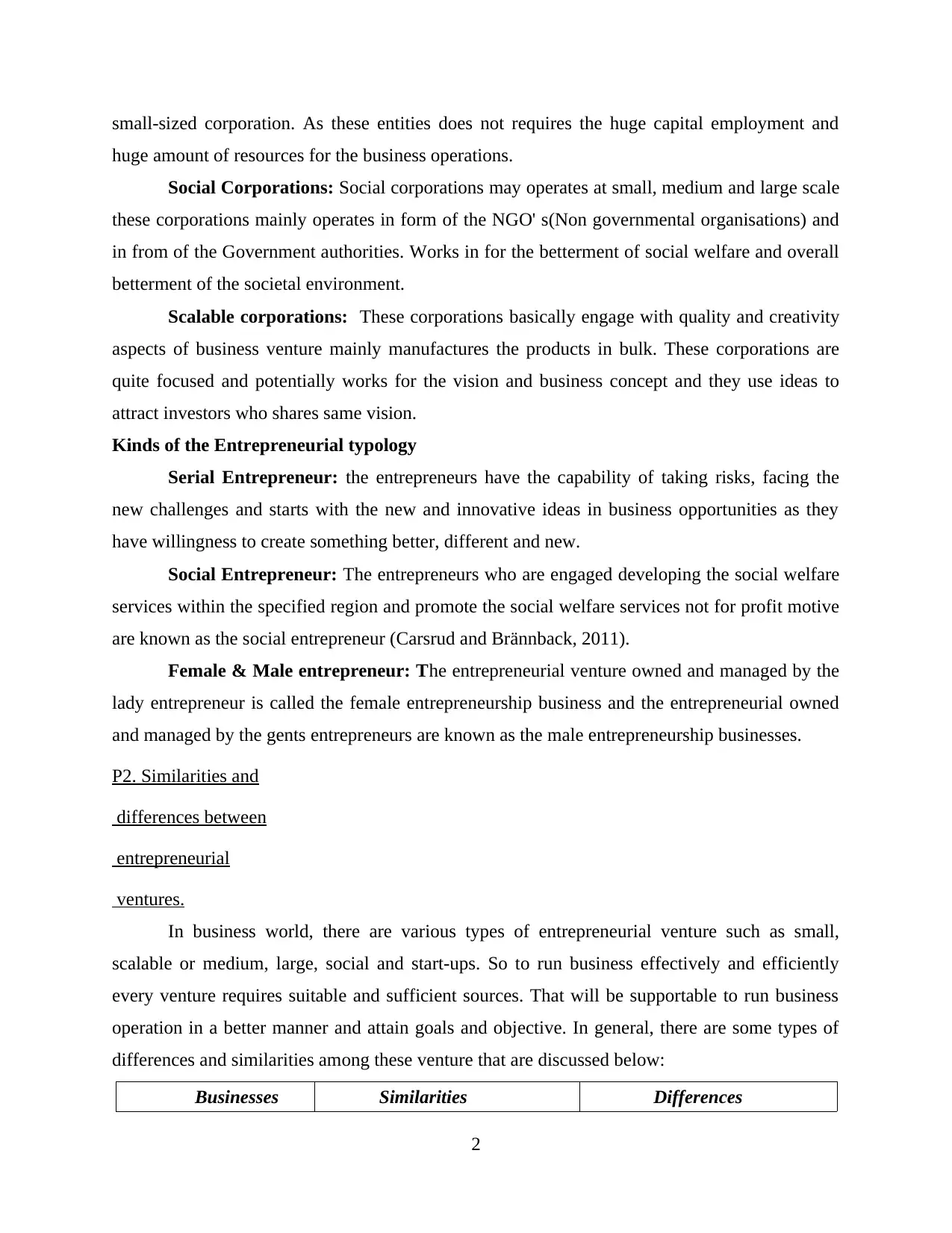
small-sized corporation. As these entities does not requires the huge capital employment and
huge amount of resources for the business operations.
Social Corporations: Social corporations may operates at small, medium and large scale
these corporations mainly operates in form of the NGO' s(Non governmental organisations) and
in from of the Government authorities. Works in for the betterment of social welfare and overall
betterment of the societal environment.
Scalable corporations: These corporations basically engage with quality and creativity
aspects of business venture mainly manufactures the products in bulk. These corporations are
quite focused and potentially works for the vision and business concept and they use ideas to
attract investors who shares same vision.
Kinds of the Entrepreneurial typology
Serial Entrepreneur: the entrepreneurs have the capability of taking risks, facing the
new challenges and starts with the new and innovative ideas in business opportunities as they
have willingness to create something better, different and new.
Social Entrepreneur: The entrepreneurs who are engaged developing the social welfare
services within the specified region and promote the social welfare services not for profit motive
are known as the social entrepreneur (Carsrud and Brännback, 2011).
Female & Male entrepreneur: The entrepreneurial venture owned and managed by the
lady entrepreneur is called the female entrepreneurship business and the entrepreneurial owned
and managed by the gents entrepreneurs are known as the male entrepreneurship businesses.
P2. Similarities and
differences between
entrepreneurial
ventures.
In business world, there are various types of entrepreneurial venture such as small,
scalable or medium, large, social and start-ups. So to run business effectively and efficiently
every venture requires suitable and sufficient sources. That will be supportable to run business
operation in a better manner and attain goals and objective. In general, there are some types of
differences and similarities among these venture that are discussed below:
Businesses Similarities Differences
2
huge amount of resources for the business operations.
Social Corporations: Social corporations may operates at small, medium and large scale
these corporations mainly operates in form of the NGO' s(Non governmental organisations) and
in from of the Government authorities. Works in for the betterment of social welfare and overall
betterment of the societal environment.
Scalable corporations: These corporations basically engage with quality and creativity
aspects of business venture mainly manufactures the products in bulk. These corporations are
quite focused and potentially works for the vision and business concept and they use ideas to
attract investors who shares same vision.
Kinds of the Entrepreneurial typology
Serial Entrepreneur: the entrepreneurs have the capability of taking risks, facing the
new challenges and starts with the new and innovative ideas in business opportunities as they
have willingness to create something better, different and new.
Social Entrepreneur: The entrepreneurs who are engaged developing the social welfare
services within the specified region and promote the social welfare services not for profit motive
are known as the social entrepreneur (Carsrud and Brännback, 2011).
Female & Male entrepreneur: The entrepreneurial venture owned and managed by the
lady entrepreneur is called the female entrepreneurship business and the entrepreneurial owned
and managed by the gents entrepreneurs are known as the male entrepreneurship businesses.
P2. Similarities and
differences between
entrepreneurial
ventures.
In business world, there are various types of entrepreneurial venture such as small,
scalable or medium, large, social and start-ups. So to run business effectively and efficiently
every venture requires suitable and sufficient sources. That will be supportable to run business
operation in a better manner and attain goals and objective. In general, there are some types of
differences and similarities among these venture that are discussed below:
Businesses Similarities Differences
2
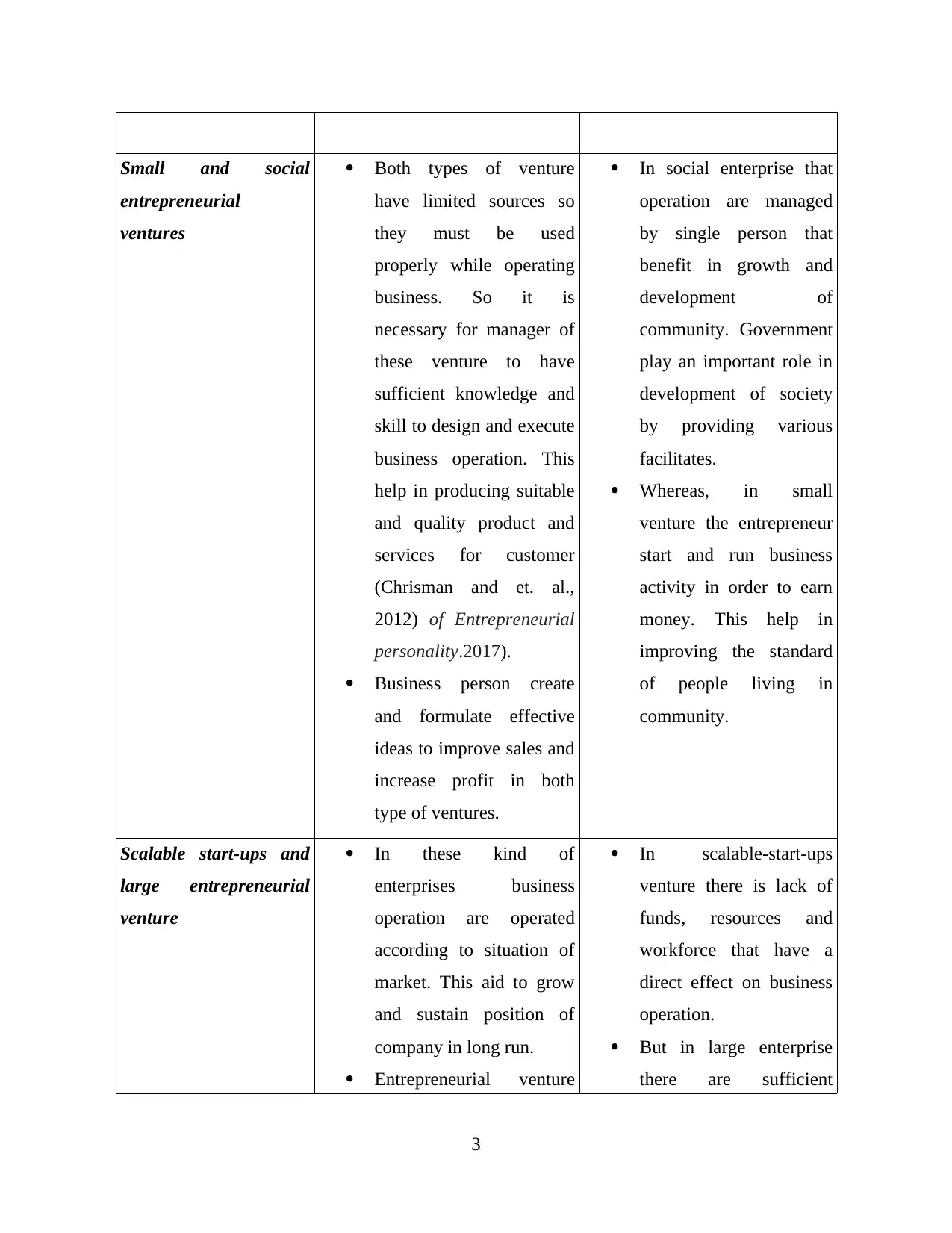
Small and social
entrepreneurial
ventures
Both types of venture
have limited sources so
they must be used
properly while operating
business. So it is
necessary for manager of
these venture to have
sufficient knowledge and
skill to design and execute
business operation. This
help in producing suitable
and quality product and
services for customer
(Chrisman and et. al.,
2012) of Entrepreneurial
personality.2017).
Business person create
and formulate effective
ideas to improve sales and
increase profit in both
type of ventures.
In social enterprise that
operation are managed
by single person that
benefit in growth and
development of
community. Government
play an important role in
development of society
by providing various
facilitates.
Whereas, in small
venture the entrepreneur
start and run business
activity in order to earn
money. This help in
improving the standard
of people living in
community.
Scalable start-ups and
large entrepreneurial
venture
In these kind of
enterprises business
operation are operated
according to situation of
market. This aid to grow
and sustain position of
company in long run.
Entrepreneurial venture
In scalable-start-ups
venture there is lack of
funds, resources and
workforce that have a
direct effect on business
operation.
But in large enterprise
there are sufficient
3
entrepreneurial
ventures
Both types of venture
have limited sources so
they must be used
properly while operating
business. So it is
necessary for manager of
these venture to have
sufficient knowledge and
skill to design and execute
business operation. This
help in producing suitable
and quality product and
services for customer
(Chrisman and et. al.,
2012) of Entrepreneurial
personality.2017).
Business person create
and formulate effective
ideas to improve sales and
increase profit in both
type of ventures.
In social enterprise that
operation are managed
by single person that
benefit in growth and
development of
community. Government
play an important role in
development of society
by providing various
facilitates.
Whereas, in small
venture the entrepreneur
start and run business
activity in order to earn
money. This help in
improving the standard
of people living in
community.
Scalable start-ups and
large entrepreneurial
venture
In these kind of
enterprises business
operation are operated
according to situation of
market. This aid to grow
and sustain position of
company in long run.
Entrepreneurial venture
In scalable-start-ups
venture there is lack of
funds, resources and
workforce that have a
direct effect on business
operation.
But in large enterprise
there are sufficient
3
⊘ This is a preview!⊘
Do you want full access?
Subscribe today to unlock all pages.

Trusted by 1+ million students worldwide
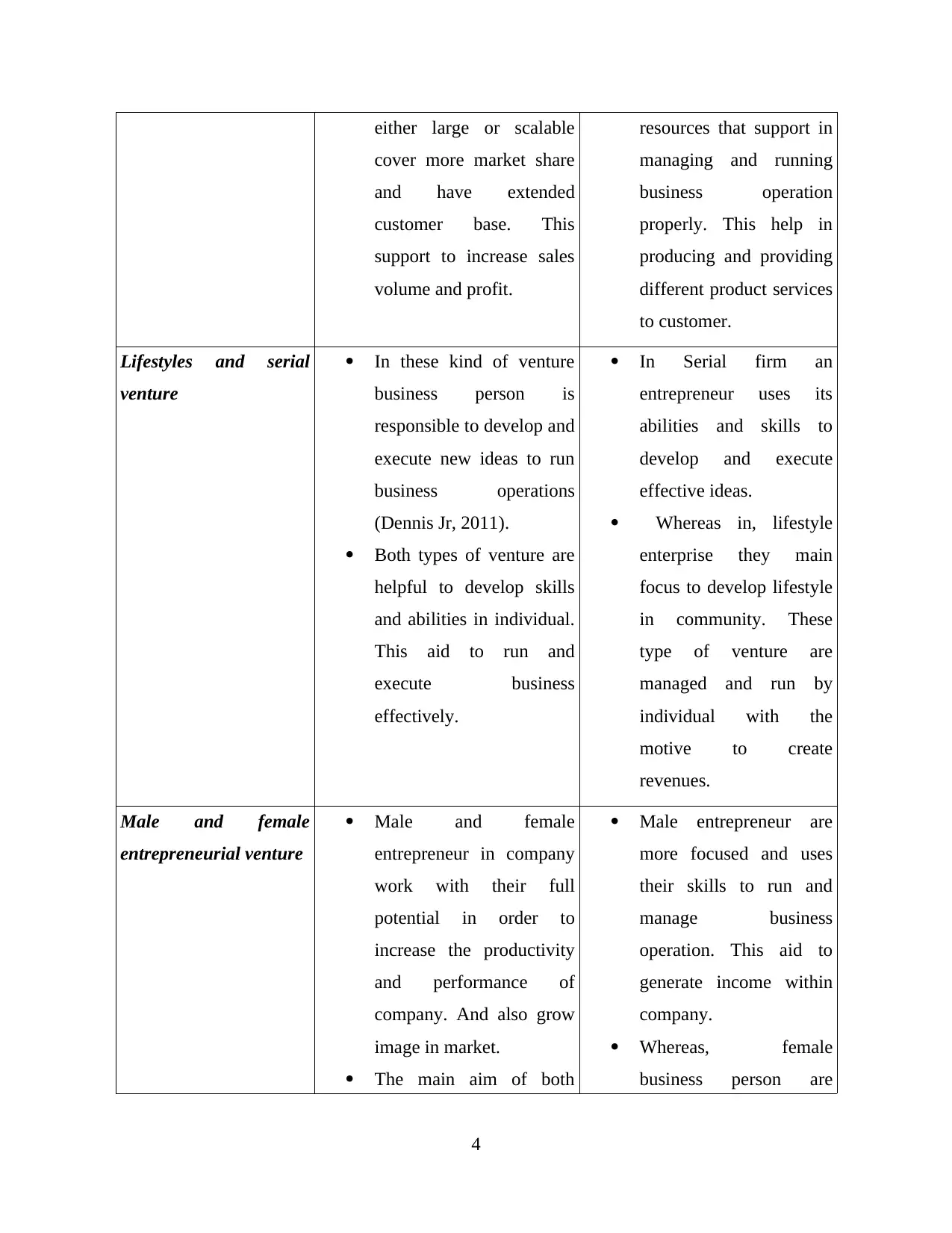
either large or scalable
cover more market share
and have extended
customer base. This
support to increase sales
volume and profit.
resources that support in
managing and running
business operation
properly. This help in
producing and providing
different product services
to customer.
Lifestyles and serial
venture
In these kind of venture
business person is
responsible to develop and
execute new ideas to run
business operations
(Dennis Jr, 2011).
Both types of venture are
helpful to develop skills
and abilities in individual.
This aid to run and
execute business
effectively.
In Serial firm an
entrepreneur uses its
abilities and skills to
develop and execute
effective ideas.
Whereas in, lifestyle
enterprise they main
focus to develop lifestyle
in community. These
type of venture are
managed and run by
individual with the
motive to create
revenues.
Male and female
entrepreneurial venture
Male and female
entrepreneur in company
work with their full
potential in order to
increase the productivity
and performance of
company. And also grow
image in market.
The main aim of both
Male entrepreneur are
more focused and uses
their skills to run and
manage business
operation. This aid to
generate income within
company.
Whereas, female
business person are
4
cover more market share
and have extended
customer base. This
support to increase sales
volume and profit.
resources that support in
managing and running
business operation
properly. This help in
producing and providing
different product services
to customer.
Lifestyles and serial
venture
In these kind of venture
business person is
responsible to develop and
execute new ideas to run
business operations
(Dennis Jr, 2011).
Both types of venture are
helpful to develop skills
and abilities in individual.
This aid to run and
execute business
effectively.
In Serial firm an
entrepreneur uses its
abilities and skills to
develop and execute
effective ideas.
Whereas in, lifestyle
enterprise they main
focus to develop lifestyle
in community. These
type of venture are
managed and run by
individual with the
motive to create
revenues.
Male and female
entrepreneurial venture
Male and female
entrepreneur in company
work with their full
potential in order to
increase the productivity
and performance of
company. And also grow
image in market.
The main aim of both
Male entrepreneur are
more focused and uses
their skills to run and
manage business
operation. This aid to
generate income within
company.
Whereas, female
business person are
4
Paraphrase This Document
Need a fresh take? Get an instant paraphrase of this document with our AI Paraphraser
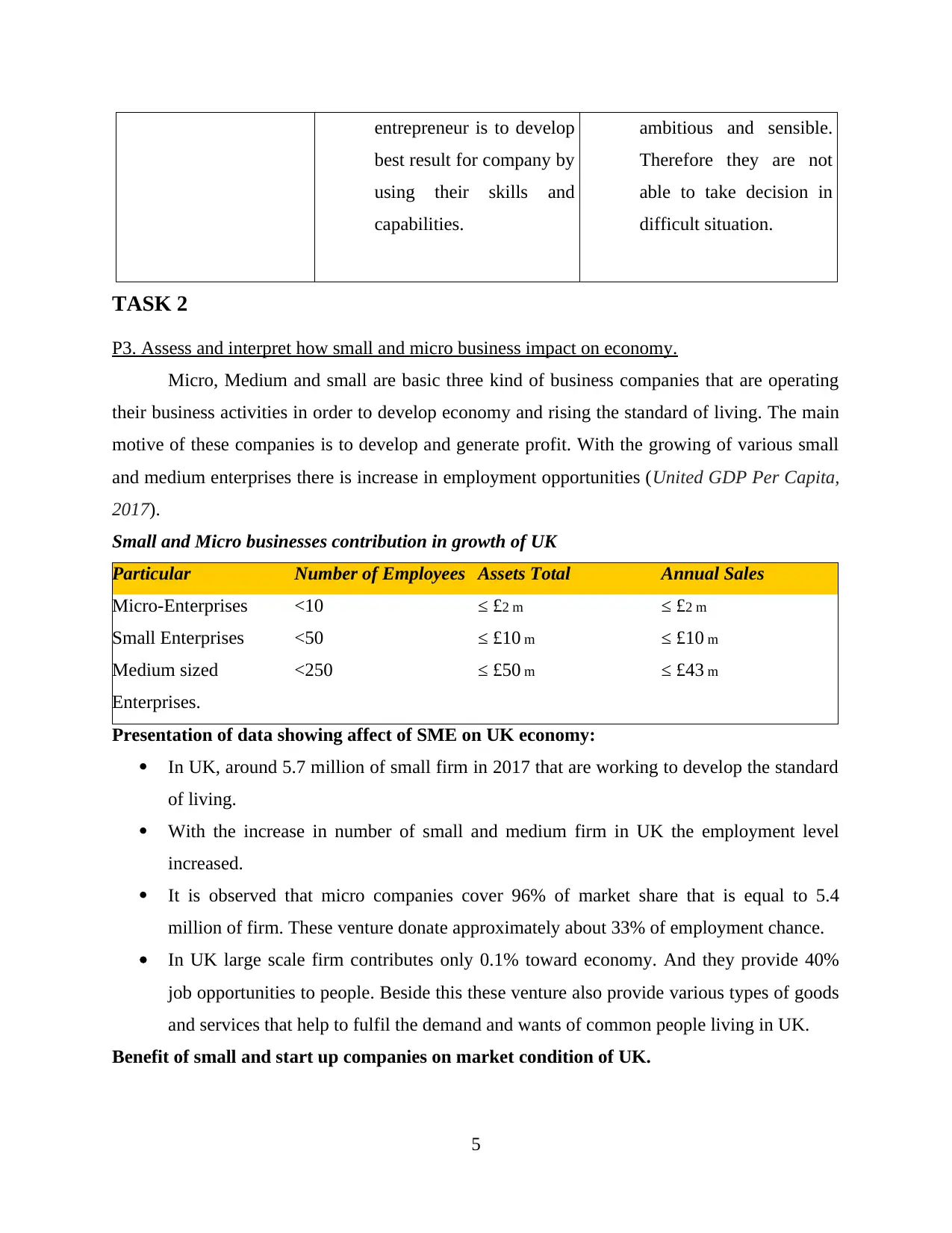
entrepreneur is to develop
best result for company by
using their skills and
capabilities.
ambitious and sensible.
Therefore they are not
able to take decision in
difficult situation.
TASK 2
P3. Assess and interpret how small and micro business impact on economy.
Micro, Medium and small are basic three kind of business companies that are operating
their business activities in order to develop economy and rising the standard of living. The main
motive of these companies is to develop and generate profit. With the growing of various small
and medium enterprises there is increase in employment opportunities (United GDP Per Capita,
2017).
Small and Micro businesses contribution in growth of UK
Particular Number of Employees Assets Total Annual Sales
Micro-Enterprises <10 ≤ £2 m ≤ £2 m
Small Enterprises <50 ≤ £10 m ≤ £10 m
Medium sized
Enterprises.
<250 ≤ £50 m ≤ £43 m
Presentation of data showing affect of SME on UK economy:
In UK, around 5.7 million of small firm in 2017 that are working to develop the standard
of living.
With the increase in number of small and medium firm in UK the employment level
increased.
It is observed that micro companies cover 96% of market share that is equal to 5.4
million of firm. These venture donate approximately about 33% of employment chance.
In UK large scale firm contributes only 0.1% toward economy. And they provide 40%
job opportunities to people. Beside this these venture also provide various types of goods
and services that help to fulfil the demand and wants of common people living in UK.
Benefit of small and start up companies on market condition of UK.
5
best result for company by
using their skills and
capabilities.
ambitious and sensible.
Therefore they are not
able to take decision in
difficult situation.
TASK 2
P3. Assess and interpret how small and micro business impact on economy.
Micro, Medium and small are basic three kind of business companies that are operating
their business activities in order to develop economy and rising the standard of living. The main
motive of these companies is to develop and generate profit. With the growing of various small
and medium enterprises there is increase in employment opportunities (United GDP Per Capita,
2017).
Small and Micro businesses contribution in growth of UK
Particular Number of Employees Assets Total Annual Sales
Micro-Enterprises <10 ≤ £2 m ≤ £2 m
Small Enterprises <50 ≤ £10 m ≤ £10 m
Medium sized
Enterprises.
<250 ≤ £50 m ≤ £43 m
Presentation of data showing affect of SME on UK economy:
In UK, around 5.7 million of small firm in 2017 that are working to develop the standard
of living.
With the increase in number of small and medium firm in UK the employment level
increased.
It is observed that micro companies cover 96% of market share that is equal to 5.4
million of firm. These venture donate approximately about 33% of employment chance.
In UK large scale firm contributes only 0.1% toward economy. And they provide 40%
job opportunities to people. Beside this these venture also provide various types of goods
and services that help to fulfil the demand and wants of common people living in UK.
Benefit of small and start up companies on market condition of UK.
5
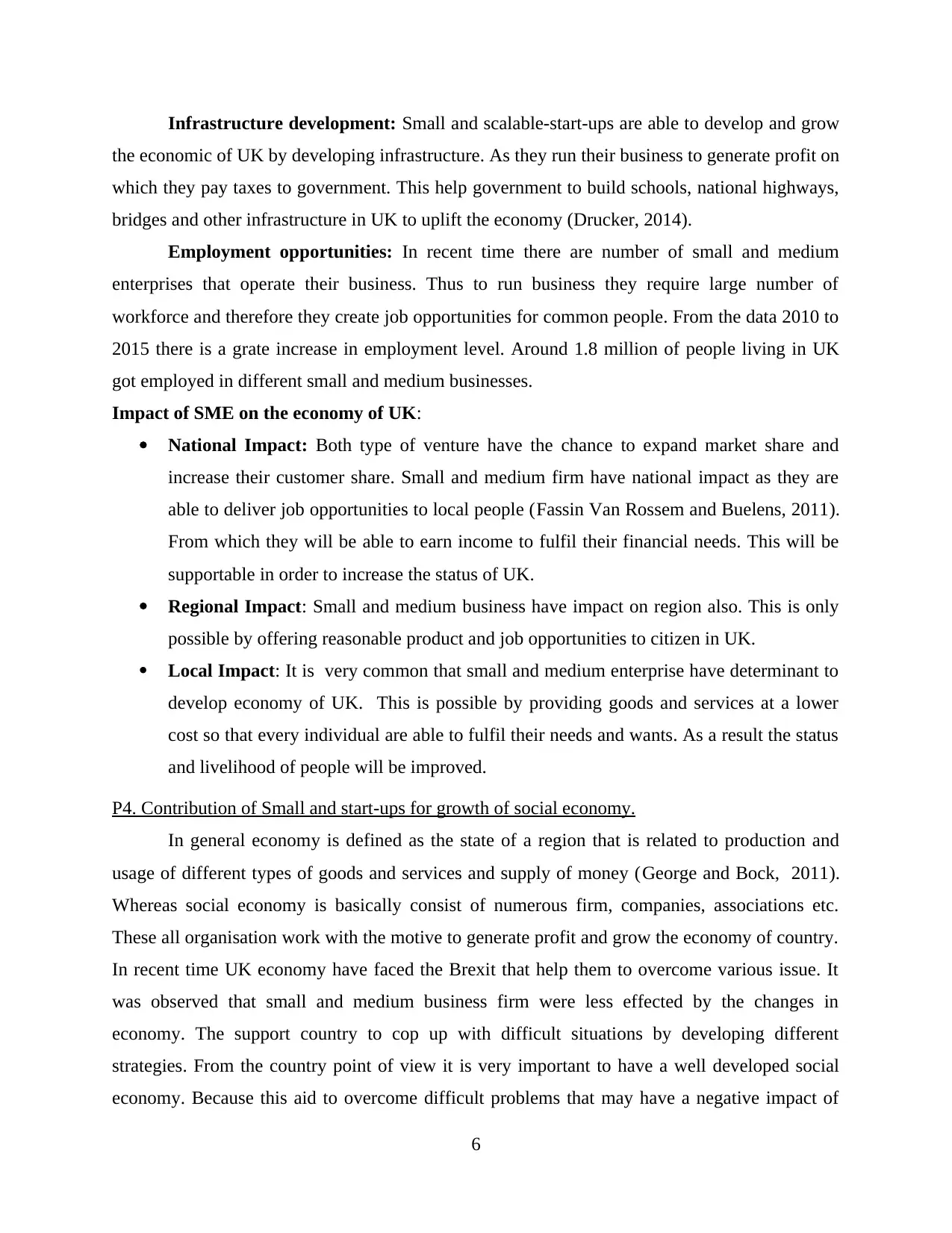
Infrastructure development: Small and scalable-start-ups are able to develop and grow
the economic of UK by developing infrastructure. As they run their business to generate profit on
which they pay taxes to government. This help government to build schools, national highways,
bridges and other infrastructure in UK to uplift the economy (Drucker, 2014).
Employment opportunities: In recent time there are number of small and medium
enterprises that operate their business. Thus to run business they require large number of
workforce and therefore they create job opportunities for common people. From the data 2010 to
2015 there is a grate increase in employment level. Around 1.8 million of people living in UK
got employed in different small and medium businesses.
Impact of SME on the economy of UK:
National Impact: Both type of venture have the chance to expand market share and
increase their customer share. Small and medium firm have national impact as they are
able to deliver job opportunities to local people (Fassin Van Rossem and Buelens, 2011).
From which they will be able to earn income to fulfil their financial needs. This will be
supportable in order to increase the status of UK.
Regional Impact: Small and medium business have impact on region also. This is only
possible by offering reasonable product and job opportunities to citizen in UK.
Local Impact: It is very common that small and medium enterprise have determinant to
develop economy of UK. This is possible by providing goods and services at a lower
cost so that every individual are able to fulfil their needs and wants. As a result the status
and livelihood of people will be improved.
P4. Contribution of Small and start-ups for growth of social economy.
In general economy is defined as the state of a region that is related to production and
usage of different types of goods and services and supply of money (George and Bock, 2011).
Whereas social economy is basically consist of numerous firm, companies, associations etc.
These all organisation work with the motive to generate profit and grow the economy of country.
In recent time UK economy have faced the Brexit that help them to overcome various issue. It
was observed that small and medium business firm were less effected by the changes in
economy. The support country to cop up with difficult situations by developing different
strategies. From the country point of view it is very important to have a well developed social
economy. Because this aid to overcome difficult problems that may have a negative impact of
6
the economic of UK by developing infrastructure. As they run their business to generate profit on
which they pay taxes to government. This help government to build schools, national highways,
bridges and other infrastructure in UK to uplift the economy (Drucker, 2014).
Employment opportunities: In recent time there are number of small and medium
enterprises that operate their business. Thus to run business they require large number of
workforce and therefore they create job opportunities for common people. From the data 2010 to
2015 there is a grate increase in employment level. Around 1.8 million of people living in UK
got employed in different small and medium businesses.
Impact of SME on the economy of UK:
National Impact: Both type of venture have the chance to expand market share and
increase their customer share. Small and medium firm have national impact as they are
able to deliver job opportunities to local people (Fassin Van Rossem and Buelens, 2011).
From which they will be able to earn income to fulfil their financial needs. This will be
supportable in order to increase the status of UK.
Regional Impact: Small and medium business have impact on region also. This is only
possible by offering reasonable product and job opportunities to citizen in UK.
Local Impact: It is very common that small and medium enterprise have determinant to
develop economy of UK. This is possible by providing goods and services at a lower
cost so that every individual are able to fulfil their needs and wants. As a result the status
and livelihood of people will be improved.
P4. Contribution of Small and start-ups for growth of social economy.
In general economy is defined as the state of a region that is related to production and
usage of different types of goods and services and supply of money (George and Bock, 2011).
Whereas social economy is basically consist of numerous firm, companies, associations etc.
These all organisation work with the motive to generate profit and grow the economy of country.
In recent time UK economy have faced the Brexit that help them to overcome various issue. It
was observed that small and medium business firm were less effected by the changes in
economy. The support country to cop up with difficult situations by developing different
strategies. From the country point of view it is very important to have a well developed social
economy. Because this aid to overcome difficult problems that may have a negative impact of
6
⊘ This is a preview!⊘
Do you want full access?
Subscribe today to unlock all pages.

Trusted by 1+ million students worldwide
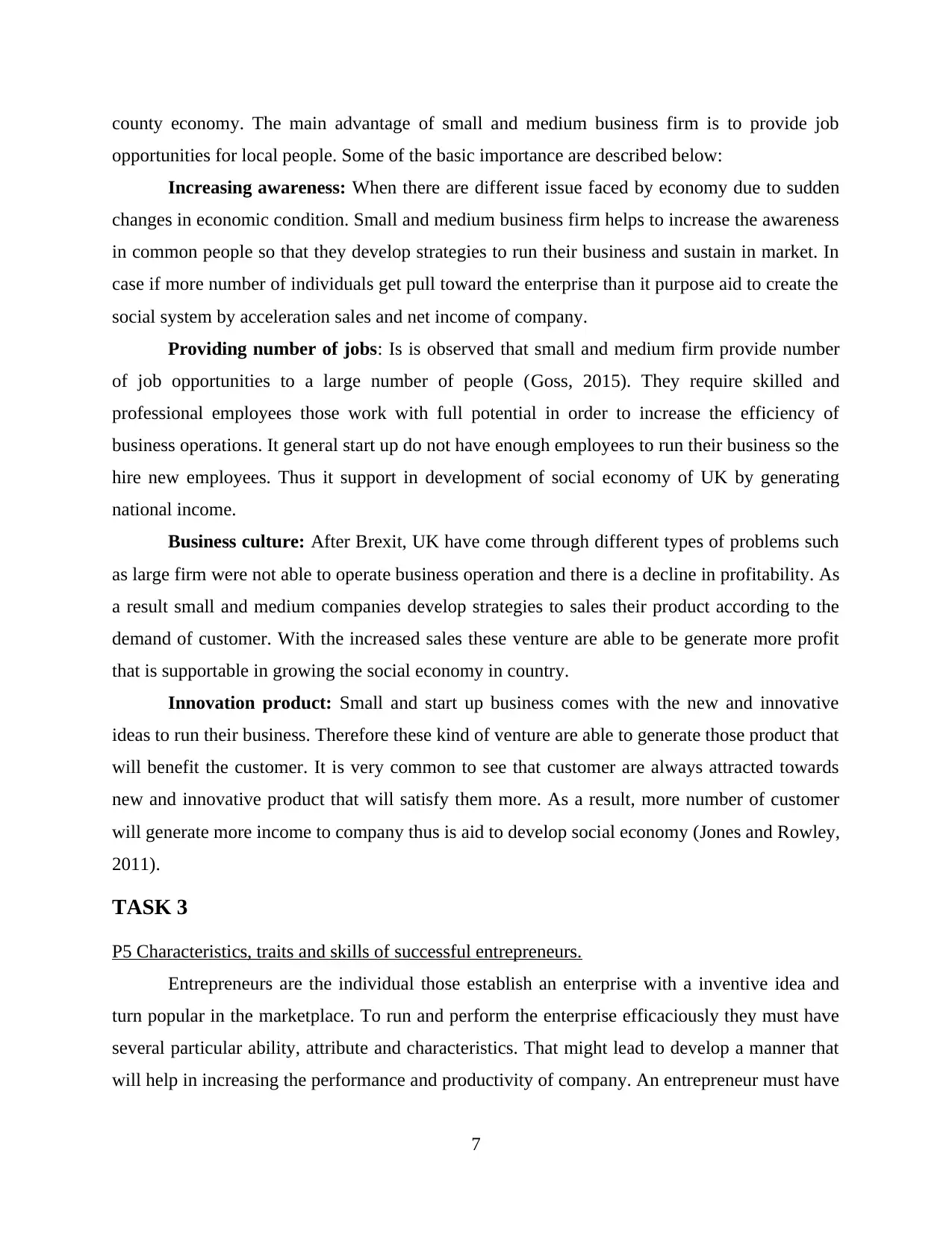
county economy. The main advantage of small and medium business firm is to provide job
opportunities for local people. Some of the basic importance are described below:
Increasing awareness: When there are different issue faced by economy due to sudden
changes in economic condition. Small and medium business firm helps to increase the awareness
in common people so that they develop strategies to run their business and sustain in market. In
case if more number of individuals get pull toward the enterprise than it purpose aid to create the
social system by acceleration sales and net income of company.
Providing number of jobs: Is is observed that small and medium firm provide number
of job opportunities to a large number of people (Goss, 2015). They require skilled and
professional employees those work with full potential in order to increase the efficiency of
business operations. It general start up do not have enough employees to run their business so the
hire new employees. Thus it support in development of social economy of UK by generating
national income.
Business culture: After Brexit, UK have come through different types of problems such
as large firm were not able to operate business operation and there is a decline in profitability. As
a result small and medium companies develop strategies to sales their product according to the
demand of customer. With the increased sales these venture are able to be generate more profit
that is supportable in growing the social economy in country.
Innovation product: Small and start up business comes with the new and innovative
ideas to run their business. Therefore these kind of venture are able to generate those product that
will benefit the customer. It is very common to see that customer are always attracted towards
new and innovative product that will satisfy them more. As a result, more number of customer
will generate more income to company thus is aid to develop social economy (Jones and Rowley,
2011).
TASK 3
P5 Characteristics, traits and skills of successful entrepreneurs.
Entrepreneurs are the individual those establish an enterprise with a inventive idea and
turn popular in the marketplace. To run and perform the enterprise efficaciously they must have
several particular ability, attribute and characteristics. That might lead to develop a manner that
will help in increasing the performance and productivity of company. An entrepreneur must have
7
opportunities for local people. Some of the basic importance are described below:
Increasing awareness: When there are different issue faced by economy due to sudden
changes in economic condition. Small and medium business firm helps to increase the awareness
in common people so that they develop strategies to run their business and sustain in market. In
case if more number of individuals get pull toward the enterprise than it purpose aid to create the
social system by acceleration sales and net income of company.
Providing number of jobs: Is is observed that small and medium firm provide number
of job opportunities to a large number of people (Goss, 2015). They require skilled and
professional employees those work with full potential in order to increase the efficiency of
business operations. It general start up do not have enough employees to run their business so the
hire new employees. Thus it support in development of social economy of UK by generating
national income.
Business culture: After Brexit, UK have come through different types of problems such
as large firm were not able to operate business operation and there is a decline in profitability. As
a result small and medium companies develop strategies to sales their product according to the
demand of customer. With the increased sales these venture are able to be generate more profit
that is supportable in growing the social economy in country.
Innovation product: Small and start up business comes with the new and innovative
ideas to run their business. Therefore these kind of venture are able to generate those product that
will benefit the customer. It is very common to see that customer are always attracted towards
new and innovative product that will satisfy them more. As a result, more number of customer
will generate more income to company thus is aid to develop social economy (Jones and Rowley,
2011).
TASK 3
P5 Characteristics, traits and skills of successful entrepreneurs.
Entrepreneurs are the individual those establish an enterprise with a inventive idea and
turn popular in the marketplace. To run and perform the enterprise efficaciously they must have
several particular ability, attribute and characteristics. That might lead to develop a manner that
will help in increasing the performance and productivity of company. An entrepreneur must have
7
Paraphrase This Document
Need a fresh take? Get an instant paraphrase of this document with our AI Paraphraser
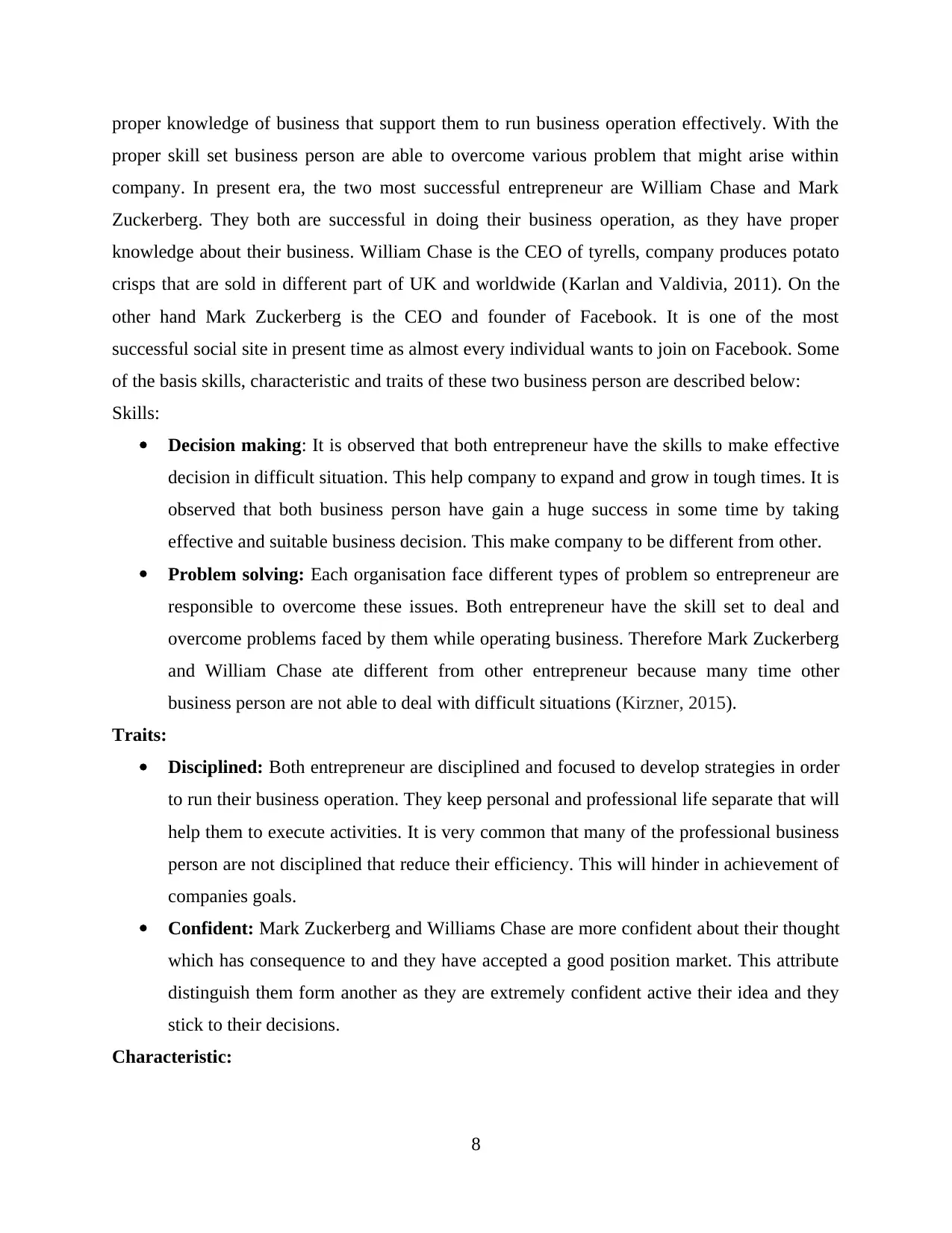
proper knowledge of business that support them to run business operation effectively. With the
proper skill set business person are able to overcome various problem that might arise within
company. In present era, the two most successful entrepreneur are William Chase and Mark
Zuckerberg. They both are successful in doing their business operation, as they have proper
knowledge about their business. William Chase is the CEO of tyrells, company produces potato
crisps that are sold in different part of UK and worldwide (Karlan and Valdivia, 2011). On the
other hand Mark Zuckerberg is the CEO and founder of Facebook. It is one of the most
successful social site in present time as almost every individual wants to join on Facebook. Some
of the basis skills, characteristic and traits of these two business person are described below:
Skills:
Decision making: It is observed that both entrepreneur have the skills to make effective
decision in difficult situation. This help company to expand and grow in tough times. It is
observed that both business person have gain a huge success in some time by taking
effective and suitable business decision. This make company to be different from other.
Problem solving: Each organisation face different types of problem so entrepreneur are
responsible to overcome these issues. Both entrepreneur have the skill set to deal and
overcome problems faced by them while operating business. Therefore Mark Zuckerberg
and William Chase ate different from other entrepreneur because many time other
business person are not able to deal with difficult situations (Kirzner, 2015).
Traits:
Disciplined: Both entrepreneur are disciplined and focused to develop strategies in order
to run their business operation. They keep personal and professional life separate that will
help them to execute activities. It is very common that many of the professional business
person are not disciplined that reduce their efficiency. This will hinder in achievement of
companies goals.
Confident: Mark Zuckerberg and Williams Chase are more confident about their thought
which has consequence to and they have accepted a good position market. This attribute
distinguish them form another as they are extremely confident active their idea and they
stick to their decisions.
Characteristic:
8
proper skill set business person are able to overcome various problem that might arise within
company. In present era, the two most successful entrepreneur are William Chase and Mark
Zuckerberg. They both are successful in doing their business operation, as they have proper
knowledge about their business. William Chase is the CEO of tyrells, company produces potato
crisps that are sold in different part of UK and worldwide (Karlan and Valdivia, 2011). On the
other hand Mark Zuckerberg is the CEO and founder of Facebook. It is one of the most
successful social site in present time as almost every individual wants to join on Facebook. Some
of the basis skills, characteristic and traits of these two business person are described below:
Skills:
Decision making: It is observed that both entrepreneur have the skills to make effective
decision in difficult situation. This help company to expand and grow in tough times. It is
observed that both business person have gain a huge success in some time by taking
effective and suitable business decision. This make company to be different from other.
Problem solving: Each organisation face different types of problem so entrepreneur are
responsible to overcome these issues. Both entrepreneur have the skill set to deal and
overcome problems faced by them while operating business. Therefore Mark Zuckerberg
and William Chase ate different from other entrepreneur because many time other
business person are not able to deal with difficult situations (Kirzner, 2015).
Traits:
Disciplined: Both entrepreneur are disciplined and focused to develop strategies in order
to run their business operation. They keep personal and professional life separate that will
help them to execute activities. It is very common that many of the professional business
person are not disciplined that reduce their efficiency. This will hinder in achievement of
companies goals.
Confident: Mark Zuckerberg and Williams Chase are more confident about their thought
which has consequence to and they have accepted a good position market. This attribute
distinguish them form another as they are extremely confident active their idea and they
stick to their decisions.
Characteristic:
8
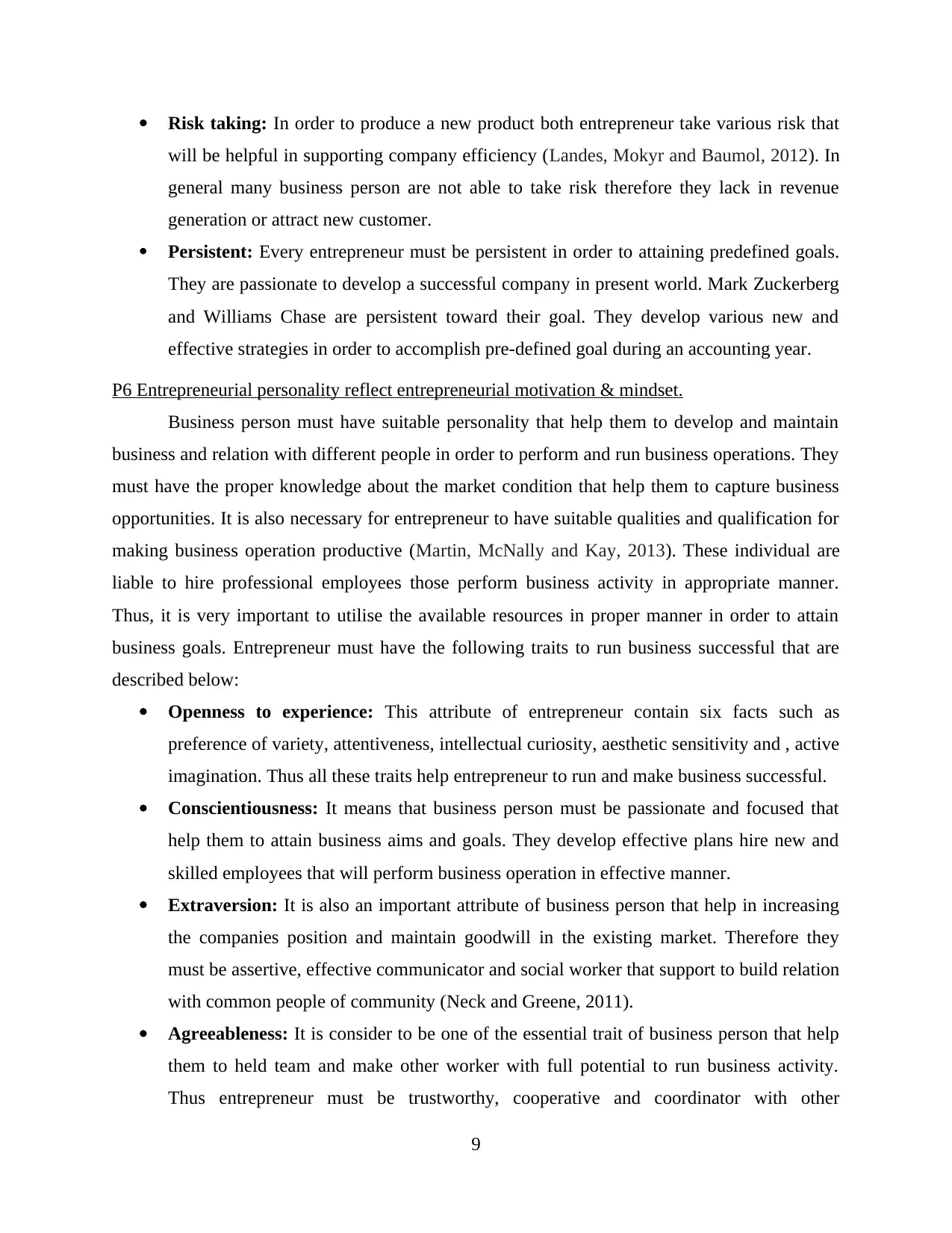
Risk taking: In order to produce a new product both entrepreneur take various risk that
will be helpful in supporting company efficiency (Landes, Mokyr and Baumol, 2012). In
general many business person are not able to take risk therefore they lack in revenue
generation or attract new customer.
Persistent: Every entrepreneur must be persistent in order to attaining predefined goals.
They are passionate to develop a successful company in present world. Mark Zuckerberg
and Williams Chase are persistent toward their goal. They develop various new and
effective strategies in order to accomplish pre-defined goal during an accounting year.
P6 Entrepreneurial personality reflect entrepreneurial motivation & mindset.
Business person must have suitable personality that help them to develop and maintain
business and relation with different people in order to perform and run business operations. They
must have the proper knowledge about the market condition that help them to capture business
opportunities. It is also necessary for entrepreneur to have suitable qualities and qualification for
making business operation productive (Martin, McNally and Kay, 2013). These individual are
liable to hire professional employees those perform business activity in appropriate manner.
Thus, it is very important to utilise the available resources in proper manner in order to attain
business goals. Entrepreneur must have the following traits to run business successful that are
described below:
Openness to experience: This attribute of entrepreneur contain six facts such as
preference of variety, attentiveness, intellectual curiosity, aesthetic sensitivity and , active
imagination. Thus all these traits help entrepreneur to run and make business successful.
Conscientiousness: It means that business person must be passionate and focused that
help them to attain business aims and goals. They develop effective plans hire new and
skilled employees that will perform business operation in effective manner.
Extraversion: It is also an important attribute of business person that help in increasing
the companies position and maintain goodwill in the existing market. Therefore they
must be assertive, effective communicator and social worker that support to build relation
with common people of community (Neck and Greene, 2011).
Agreeableness: It is consider to be one of the essential trait of business person that help
them to held team and make other worker with full potential to run business activity.
Thus entrepreneur must be trustworthy, cooperative and coordinator with other
9
will be helpful in supporting company efficiency (Landes, Mokyr and Baumol, 2012). In
general many business person are not able to take risk therefore they lack in revenue
generation or attract new customer.
Persistent: Every entrepreneur must be persistent in order to attaining predefined goals.
They are passionate to develop a successful company in present world. Mark Zuckerberg
and Williams Chase are persistent toward their goal. They develop various new and
effective strategies in order to accomplish pre-defined goal during an accounting year.
P6 Entrepreneurial personality reflect entrepreneurial motivation & mindset.
Business person must have suitable personality that help them to develop and maintain
business and relation with different people in order to perform and run business operations. They
must have the proper knowledge about the market condition that help them to capture business
opportunities. It is also necessary for entrepreneur to have suitable qualities and qualification for
making business operation productive (Martin, McNally and Kay, 2013). These individual are
liable to hire professional employees those perform business activity in appropriate manner.
Thus, it is very important to utilise the available resources in proper manner in order to attain
business goals. Entrepreneur must have the following traits to run business successful that are
described below:
Openness to experience: This attribute of entrepreneur contain six facts such as
preference of variety, attentiveness, intellectual curiosity, aesthetic sensitivity and , active
imagination. Thus all these traits help entrepreneur to run and make business successful.
Conscientiousness: It means that business person must be passionate and focused that
help them to attain business aims and goals. They develop effective plans hire new and
skilled employees that will perform business operation in effective manner.
Extraversion: It is also an important attribute of business person that help in increasing
the companies position and maintain goodwill in the existing market. Therefore they
must be assertive, effective communicator and social worker that support to build relation
with common people of community (Neck and Greene, 2011).
Agreeableness: It is consider to be one of the essential trait of business person that help
them to held team and make other worker with full potential to run business activity.
Thus entrepreneur must be trustworthy, cooperative and coordinator with other
9
⊘ This is a preview!⊘
Do you want full access?
Subscribe today to unlock all pages.

Trusted by 1+ million students worldwide
1 out of 16
Related Documents
Your All-in-One AI-Powered Toolkit for Academic Success.
+13062052269
info@desklib.com
Available 24*7 on WhatsApp / Email
![[object Object]](/_next/static/media/star-bottom.7253800d.svg)
Unlock your academic potential
Copyright © 2020–2026 A2Z Services. All Rights Reserved. Developed and managed by ZUCOL.



